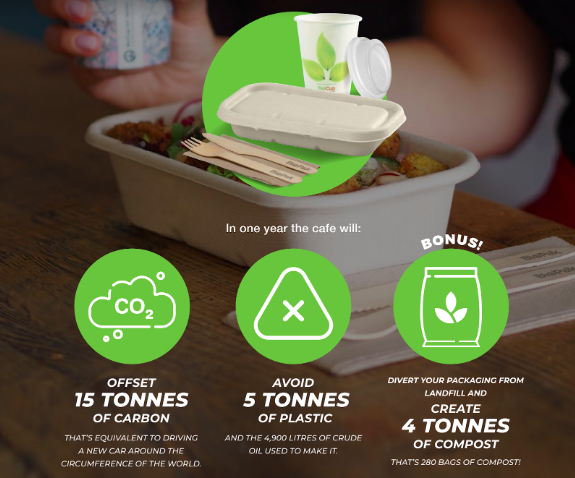Single-use plastic bans are being discussed and enforced around the world to speed up the transition towards a circular economy.
The goal is to reduce plastic pollution on land and in the oceans, and reduce the unsustainable dependencies on finite fossil fuels to make this packaging.
Many Australian states have passed new legislation to roll out single-use plastic bans from as early as March 2021. South Australia, Hobart, Queensland, the Australian Capital Territory and Western Australia are all moving towards less plastic waste over the next months by first banning plastic cutlery, straws, and stirrers, with oxo-degradable plastic items next on the agenda. So how can foodservice businesses make the switch? It’s easier than you might think:
Compostable raw materials
Sustainable options for conventional plastic items are readily available. Look for compostable alternatives made from sustainably sourced and rapidly renewable materials like sugarcane, wood or bioplastic that are certified either home (AS5810) or industrially (AS4736) compostable to Australian standards. The material reduces your carbon footprint and the certification supports the growth of the local composting infrastructure, creating jobs and enhancing soil.
Carbon neutral products
Another way to significantly reduce your impact on the planet is to look out for carbon neutral products. An increasing number of companies are purchasing carbon credits to compensate for the unavoidable greenhouse gas emissions created through the production, transportation and disposal of their products – ultimately neutralising their entire footprint.

Tree-free sugarcane
The first phase of the bans focused on cutlery, stirrers and straws, but there are so many more compostable takeaway solutions that you could try. Sugarcane pulp bowls and containers offer a quality shape and feel and are 100% plastic free. Sugarcane pulp is a waste product that would have been burned otherwise and eases the demand for tree-based materials. Sugarcane packaging is functional and elegant. It can not only be shaped into any size, but will also protect your food in transit, making it a diverse takeaway solution for any cuisine.
Start composting
Check with your council if your packaging is accepted in your FOGO bin or find your nearest composter to turn your food scraps and packaging waste into nutrient rich compost.
A small change can make a big difference
If an average cafe switched their conventional plastic packaging to 100,000 BioPak cups, sugarcane trays and wooden cutlery, in one year the cafe would offset 15 tonnes of carbon which is equivalent to driving a new car around the world. They would also avoid 5 tonnes of plastic and the 4,900 litres of crude oil used to make it. Diverting the packaging from landfill could create 4 tonnes of compost, that’s 280 bags of compost.
For more information, go to biopak.com.au
Filed under
Sponsored Content

Celebrating coffee moments with Buondi
Sponsored by Nestlé Professional

Meet Force, the new player in commercial cookware
Sponsored by Tomkin
Trending Now
Resources
Lorem ipsum dolor sit amet, consectetur adipiscing elit. Fusce ac ornare lectus. Sed bibendum lobortis...
Lorem ipsum dolor sit amet, consectetur adipiscing elit. Fusce ac ornare lectus. Sed bibendum lobortis...
Sign up for our newsletter
